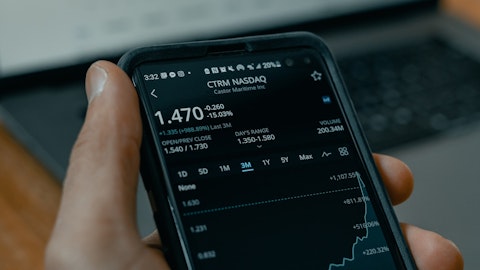Kipp DeVeer: Sorry, Penni is telling me now it shows up in the other income line. So you’ll see it there. And will you see a modest increase there if there are more amendments in the portfolio? Probably. But these are huge fees. We’re charging, right? They tend to be 50 basis points or less depending on severity of outcome.
Operator: Next question today comes from the line of Kevin Fultz from JMP Securities.
Kevin Fultz: I want to start with a question on NII. Clearly, the earnings power of the portfolio was used to rate environment. I’m just curious what you think net investment income generation will look like when we eventually transition to a neutral rate environment? And then also to kind of follow on from a previous question, how you’re balancing elevated rates versus growing the core dividend?
Kipp DeVeer: Yes. I mean, Melissa asked the question as well about the dividend before. I mean, the answer to your question is I don’t know because I don’t know what the normal rate environment is going to be. I think we’re working on an expectation that rates are elevated. They likely will go up from here. They likely will not stay there. We can all debate how long folks think they’ll stay there or not, but our best guess would be that rates will normalize and begin coming back down. My own personal view is we’re unlikely to see a 30 basis point LIBOR or SOFR again anytime soon. And that I think a lot of folks may look back is that potentially being a bit of a failed experiment. So our base case probably has rates down the line way out, normalizing down certainly from here, but my guess is as good as has as to where that is.
It’s been one of the reasons that we were cautious about raising the dividend as much as we did last quarter and frankly chose not to raise the dividend this quarter because we’d like a stronger view on where we see rates normalizing in the future.
Kevin Fultz: Okay. That all makes sense. And then my follow-up relates to the handful of companies in the portfolio that are underperforming expectations. I’m just curious to the issues you’re seeing there are more specific to inflation supply chain issues or more so the impact of rising debt service costs.
Kipp DeVeer: Yes, it’s a little bit of both, to be honest. We started seeing the inflation that everyone’s been reading about in the portfolio as far back as probably the fall of ’21. So it’s not that we weren’t expecting that. I bundle a lot of these operating concerns for companies into the same bucket, whether it’s need to pass through price increases, labor shortages, production challenges, supply issues, it’s just harder running companies these days. I think for our management teams than it’s been in a while. To your point, though, that being said, there are other companies that are not experiencing any of those issues, which simply have a lot of depth and are dealing with higher debt service costs and very limited negative influence on their overall operating results, but just dealing with higher rates. So I’d say it’s a little bit of both.
Kevin Fultz: Congratulations on a nice quarter.
Operator: The next question today comes from the line of Robert Dodd from Raymond James.
Robert Dodd: Can you give us any thought that you’ve experienced to start on house sponsors react in terms of making amendment requests or injecting capital in terms of different lines, right? I mean whether it’s financial stress, i.e., higher rates, or operational strength, does that tend to or economic stress, does that tend to change how the sponsors respond in terms of in getting more capital or asking for amendments and how fast, et cetera? This is a lot of — I mean, just high interest is one thing, but deteriorating economic environment or something else. I mean, any color on how those different environments interact with sponsors coming to you?





